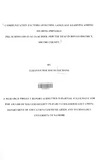| dc.description.abstract | The purpose of the study was to establish communication factors affecting language learning activities among the hearing impaired pre-schoolers in kuja school for the deaf in Rongo District, Migori county. The objectives of the study was to investigate the influence of teachers academic and professional qualifications on language learning. To establish the influence of teachers years of teaching experience on language learning among pre-school children with hearing impairment. The study was also to identify and determine the influence of teacher communication mode(s) on language learning to the hearing impaired pre-schoolers in kuja school for the deaf.
The study also looked into communication mode preferences of the teacher and the preschoolers in kuja pre-unit class and how they have an effect during teaching and learning activities. Literature review focused at the receptive and expressive communication problems of the hearing impaired children. Effects of hearing loss on language, social, development, educational mode( s) to the hearing impaired children. The communication modes reviewed were KSL, finger spelling, total communication and auditory oral approach. The researcher adopted descriptive design of a case study that enabled him to make a detailed examination of communication factors affecting language learning among hearing impaired pre-schoolers in kuja school for the deaf in Rongo District, Migori County.
The researcher purposively selected kuja school for the deaf as they cater for the hearing impaired. The sample of the study were selected from a target population of two hundred and fifteen. The researcher sampled one female pre-unit teacher, the head teacher, the pre-unit class of six boys and five girls all with hearing impairment. The instruments used to collect data were questionnaire for the headteacher, plus a questionnaire for the pre-unit teacher. The observation schedule was also used and a documentary analysis.
The findings of the study was that the pre-unit teacher had not trained in handling the hearing impaired. The communication mode preference for the teacher was total communication while pre-shcoolers preferred KSL Due to these modes of communication being used interchangeably and haphazardly, fmdings show that problems arose in understanding instructions.
Finally the researcher made necessary recommendations and suggested topics for further research. The recommendations and suggested areas are summarized in chapter five of the study. | en_US |

